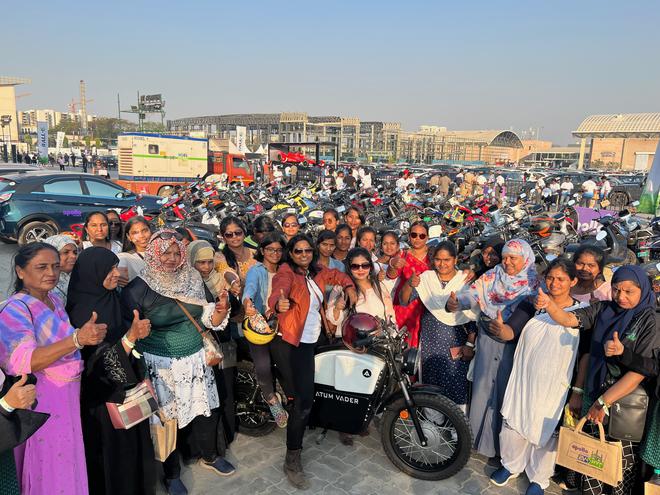When motorcyclist Jai Bharathi was leading a group of five riders on a journey from Kanyakumari to Kashmir, she was pulled over by a policeman in the middle of a highway in Madhya Pradesh. She stopped and removed her helmet. “Arrey baap re,” the cop exclaimed. “I didn’t know you were a woman. I just wanted to take a picture with you because no bikers come this way.”
ALSO READ Nikita Sonavane: justice for all
“I’ll pose for a picture if you round up some people,” she told him. “I want to give them a message.”
Within minutes the policeman conjured up a group of 50-60 people, she recalls, but only two of them were female, both under 10. When she inquired whether his village lacked women, he replied that they were safe at home. It was the perfect opportunity for Bharathi to reveal her real self. After a half-hour discussion, she says, the policeman was moved by her message that women need to access the world just like men.
Bharathi, 41, the owner of two Enfield motorcycles and veteran of marathon journeys that usually involve touching/crossing borders, has ridden more than 1,00,000 km across Southeast Asia and the U.S. She dropped architecture and decided to focus full-time on her long-standing passion in 2019. Her not-for-profit, Moving Women Social Initiatives Foundation (MoWo), promotes the idea of women in mobility through advocacy, motor training and livelihoods. It was born of the realisation that everyone on Indian roads still looks at women riders like they are an annual celestial phenomenon. She wants people to view women riders as the norm rather than as something heroic. When she spotted two women in their mid-40s, both bike taxi drivers, standing at a street corner waiting for customers in Thailand, it hit her that this powerful image would be near impossible to recreate in India. “Their counterparts here would be so conscious about what others think,” she says.

Two-wheel narrative
In a country that restricts women’s access to public spaces under the guise of ‘safety’ — despite research and data clearly demonstrating that the most dangerous place for them is often their home — women in control of their two-wheel narrative was, until very recently, a story of privilege. In Hyderabad, where Bharathi lives, the road transport authority said recently that only 5.64% of the city’s driving licenses are held by women.
Growing up, she couldn’t help but notice the gender-skewed nature of mobility skills. “Nobody says explicitly that cars are only for men, but women are not associated with automobiles at all,” she says. “Even as children we get dolls, they get cars and bikes.”
When she nudges underprivileged women to ride two and three wheelers today, she remembers an early lesson from her father, when he taught her to ride a Luna moped at age nine. “Typically, when people teach women to ride, they sit behind you and help you navigate. If you do something wrong, the person behind manages it for you,” says Bharathi. But her father told her to stand on the footpath so she would have the required height to mount the moped. “This is the brake, this is the accelerator,” he said. Then he walked a little ahead and added, “All you have to do is come towards me. If you feel scared, just drop the bike and hop off, don’t worry about anything else.” When she’s teaching women — most of whom have never gone near anything motorised except maybe a sewing machine — she ensures they don’t go down the road of co-dependency. “We don’t teach women by sitting behind them,” says Bharathi.
Bikerni diaries
They start by pushing the scooter and learning to gauge its weight and how to balance it. They learn the simple technique of lifting the scooter to rest it on the centre stand, rather than depending solely on the side stand. “The bike may be heavy, but it’s not something we can’t control,” she says. Even a wisp of a woman carries a child for months during her pregnancy, Bharathi tells them. “And unlike the two-wheeler, the stomach has no cantilever support.”
By the time Bharathi was in college, women such as Firdaus Sheikh and Urvashi Patole had formed Bikerni, the country’s first-ever biker group for women. Helped by Facebook, they collected a women-only group from across the country in 2011 and rode to the Khardung-La pass, or the highest motorable road in the world. Two years later, Bharathi started the Hyderabad chapter of Bikerni, now one of 15 across the country.
Even as the country wakes up to the issue of enabling women’s mobility, Bharathi dreams of the social transformation that these moving women will bring. “I like to use the term ‘enable’, to enable a million women in mobility by 2030.”
Increasingly, organisations are looking for or willing to invest in women who drive, and Bharathi is only happy to help. If she’s not training the female staff at BITS Pilani Hyderabad she’s establishing a motor training centre exclusively for women in collaboration with the Telangana government, making the switch to electric vehicles or planning a month-long road trip to advocate for her cause.
Last year in Rajasthan, she halted at a railway crossing. A policeman sat behind her, put his hand on her shoulder and said ‘drop me ahead’. When he thanked the ‘man’ he had hitched a ride with, Bharathi lifted her visor. The policeman was profusely apologetic. “Didn’t I drive well? I dropped you safely,” she replied. Some day soon this story won’t need to be told.
Priya Ramani is a Bengaluru-based journalist and the co-founder of India Love Project on Instagram.







